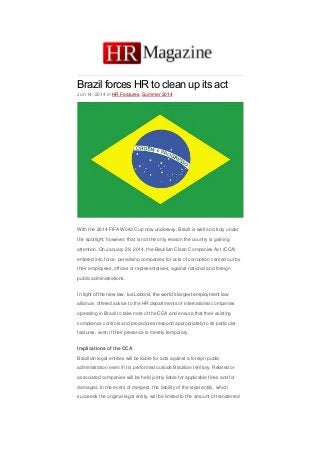
HR Magazine Hong Kong: Brazil forces HR to clean up its act
- 1. Brazil forces HR to clean up its act Jun 14, 2014 in HR Features, Summer 2014 With the 2014 FIFA World Cup now underway, Brazil is well and truly under the spotlight, however, that is not the only reason the country is gaining attention. On January 29, 2014, the Brazilian Clean Companies Act (CCA) entered into force, penalising companies for acts of corruption carried out by their employees, offices or representatives, against national and foreign public administrations. In light of the new law, Ius Laboris, the world’s largest employment law alliance, offered advice to the HR departments of international companies operating in Brazil to take note of the CCA and ensure that their existing compliance controls and procedures respond appropriately to its particular features, even if their presence is merely temporary. Implications of the CCA Brazilian legal entities will be liable for acts against a foreign public administration even if it is performed outside Brazilian territory. Related or associated companies will be held jointly liable for applicable fines and for damages. In the event of mergers, the liability of the legal entity, which succeeds the original legal entity, will be limited to the amount of transferred
- 2. assets. Other penalties will apply to the newly formed entity after the merger, in cases of fraud. Ius Laboris pointed out that organisations should not interpret the CCA as the Brazilian equivalent of the US Foreign Corrupt Practices Act (the FCPA), or the UK Bribery Act. In fact, the CCA does not provide for any criminal sanction to implicated individuals or companies’ legal representatives. It provides for civil and administrative liabilities of companies and individuals, stipulating different penalties, both administrative, which are sanctioned by governmental authorities, and judicial, which are sanctioned only by a court of law. It’s a penalty! The most significant administrative penalties can range from 0.1% to 20% of a company’s gross revenues in the year preceding the initiation of administrative proceedings (excluding taxes). The fine will not be lower than the advantage obtained, where such advantages can be assessed; if it is not possible to assess the amount of the total gross revenue of the legal entity, the fine may range from R$6,000 to R$60,000,000. Judicial sanctions range from loss of property to suspension and even compulsory dissolution of the legal entity. The Brazilian CCA does not revoke the provisions contained in other statutes that deal with similar acts, including the Antitrust Law (12,529/2011), the Administrative Misconduct Act (8,429/1992) and the Public Bidding Law (8,666/1993), among others. All such correlated legislation contains different provisions, including criminal sanctions being placed on implicated individuals, and other specific penalties applicable to companies and individuals. Get prepared HR Ius Laboris advised that while organisations that already comply with the FCPA and the UK Bribery Act will be ready and able to adhere to the terms of the CCA, the implementation of corresponding internal policies is very much advisable for HR departments. First of all, internal policies will ensure compliance with specific aspects of CCA rules. In particular, they will educate employees about specific acts and conduct that are illegalised under the act, which may not be as obvious as overt bribery. These include, for example, the duty to cooperate with public
- 3. authorities expressed in the general prohibition on obstruction of or interference with investigations or monitoring activities conducted by public authorities. The implementation of internal policies is also advisable because the CCA stipulates that the existence of internal mechanisms and procedures relating to corporate integrity, audit and incentives for reporting irregularities, and the effective application of codes of ethics and conduct within the legal entity, may be considered as a mitigating factor in the application of the relevant sanctions. The implementation of specific policies addressing the provisions of the CCA is advisable to all companies within a group and to all business partners in light of the clear cross-border provisions contained within the Act. Likewise, foreign companies who lack a local presence but nonetheless maintain interests in Brazil must also pay close attention to local business partners’ compliance with the Brazilian CCA. As way of example, any foreign company entering into a joint-venture agreement with a Brazilian company may be held jointly liable for wrongdoings committed by a local partner. Control the workplace Ius Laboris pointed out that, under national Labour Laws, companies in Brazil are duty-bound to coordinate and control their workplace, so as to ensure general compliance with laws and ethical business standards. Organisations have the authority to carry out internal investigations upon the slightest indication of non-compliance with the Brazilian CCA. Accordingly, companies may issue their own set of internal rules providing for administrative routines and compliance mechanisms. As long as they do not contain any intrinsically illegal features, such sets of internal rules will be mandatory for all employees. The communication of such rules is sufficient to put them in effect and employee acceptance is unnecessary. The internal policies stipulating ethical standards and enforcement mechanisms are essential for the companies to comply with the CCA. For example, monitoring corporate e-mail accounts will be possible under a pre- existing specific policy. Recurring training sessions are also advisable to ensure comprehension of this new law. This article was originally published in HR Magazine HK – the online version can be found here.
